
President Donald Trump’s rapid-fire efforts to overhaul the federal workforce are putting the livelihoods of more than 40,000 Coloradans into question as confusion and a sense of helplessness deepen just weeks into the new administration.
The chaos for federal employees started when Trump issued an executive order freezing federal hiring the day he was inaugurated. Things have only gotten more confusing for government workers in the intervening weeks. Some Coloradans have already lost out on paychecks.
One Colorado worker with USAID, a federal agency that provides aid overseas, was let go without warning last week. USAID is at the center of a firestorm involving billionaire Elon Musk’s moves to slash the federal government through the newly created Department of Government Efficiency, or DOGE.
The Colorado employee, who asked to remain anonymous due to concerns that going public could harm career prospects, was a contract worker at USAID who had worked there for several years.
“There was a rumor going around … towards the end of the day that we may be furloughed … And then that night, everyone was logged out of all of our shared drives and all the things we used to communicate with our teams and our colleagues. And then the next day we all got layoff notices,” the USAID worker said.
The layoffs preceded the mass buyout offer to the federal workforce.
“The contractors were terminated before that email went out, because legally, I think it’s easier to terminate a contractor versus a direct hire employee who has a lot more protections built into their work agreement,” the USAID worker said. “It’s funny how important that distinction has become.”
Veronika Stumpo had two temporary jobs lined up working for the federal government in Colorado. One was doing administrative work for the United States Geological Survey in Lakewood. The other was a position as a survey clerk with the U. S. Census Bureau, where the hours would fluctuate depending on the needs. Both offers were rescinded, according to Stumpo.
“Your tentative offer did not confirm a start date. Therefore, complying with the Presidential directive, this office officially withdraws the tentative appointment offer previously made to you,” the USGS wrote in an email viewed by CPR. “This revocation of the tentative offer does not cancel your eligibility on any existing registers, does not cancel your re-hire eligibility under the above-stated vacancy announcement, and does not debar you from Federal employment.”
Stumpo, a heart transplant recipient, just moved back to Colorado after living in Washington, D.C., for a year.
“I was really relying on those two offers … I have a shaky resume due to disability,” Stumpo told CPR.
So far, about 20,000 federal workers have taken a buyout offer, according to a report in Axios. But most workers are uncertain, according to a survey from Federal News Network, a news outlet for government workers. The survey found 77 percent of workers didn’t plan on taking the deal to resign, with 70 percent saying they don’t have enough information to make up their minds.
Federal employees have until Feb. 6 to decide whether to accept an order from the Office of Personnel Management to resign with eight months severance or take their chances under the new regime. The offer, delivered to millions of civilian employees by email last week, states that there is no assurance that workers’ jobs – or their agencies – will continue to exist if they choose to stay.
Colorado workers who spoke with CPR don’t plan on taking the buyout. An employee with a federal land agency, who asked for anonymity for fear of losing his job, said he doesn’t trust that the administration will necessarily be able to follow through on its promises.
On top of that, he likes the work he does and the agency he works for. But he’s still in his probationary period and feels especially vulnerable to future layoffs. Probationary periods for federal civil servants typically last one year.
“With previous reductions-in-force, it’s those probationary employees that they get rid of first,” he said.
The state’s longtime federal workers are nervous, too. One employee who’s been with the federal government doing administrative support work since the 1980s, who also spoke on the condition of anonymity, is hoping her tenure will protect her.
“I can’t afford to take this buyout that they’re proposing,” she said. “I have to keep working. Rents keep going up and I can’t possibly not keep my job.”
She had been approved to take a new role with a different agency which would have meant a promotion and more money. But that fell through because of the hiring freeze.
“I’ve been applying for a different agency for about four years now, and I finally got selected for a job at a different agency, and then the hiring freeze came out, so they had to rescind my offer,” she said.
She describes her current mental state with one word: helpless.
“I just want to say how careless this has been towards the people. People who are Americans … People who have been working for these agencies and putting in so much work and to treat them so disrespectfully. It just feels so wrong,” she said.
The former USAID worker called the overarching theme meanspirited.
“I saw Elon's Twitter status about how he took USAID to the wood chipper over the weekend … Efficiency is one thing. This doesn't feel like it's being done in the name of efficiency. It feels like revenge, and it feels personal. It's so disrespectful to all of the people whose jobs you just took away who have kids and families they're trying to support and are suddenly thrown into panic mode and you're just making a joke about it. I mean it, it's just gross.”









